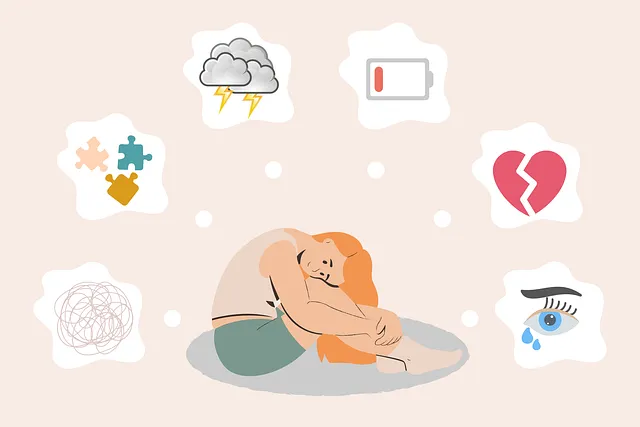Preventing Burnout: Mental Health Resources for Castle Rock Healthcare Professionals
Burnout among healthcare providers in Castle Rock is a growing concern, but accessing mental health…….
In today’s complex healthcare landscape, accessing quality mental health services is a paramount concern for many individuals and communities worldwide. Among various models, the Castle Rock approach to delivering mental healthcare has emerged as an innovative and effective strategy. This article delves into the intricacies of Castle Rock, exploring how it facilitates access to mental health services through the renowned healthcare provider, Kaiser. By understanding its principles, impact, and potential challenges, we can appreciate its role in shaping a more inclusive and accessible mental healthcare system.
Castle Rock is an innovative model designed to bridge the gap between traditional mental health services and community-based support systems. It emphasizes a holistic, collaborative approach to address the diverse needs of individuals seeking mental healthcare. The core components include:
The concept of Castle Rock emerged from a recognition that traditional mental health systems often failed to reach underserved populations effectively. This model was inspired by successful community-based initiatives and aimed to address the following challenges:
Over time, Castle Rock has evolved and been implemented in various settings globally, adapting to local contexts and needs. Its success lies in its adaptability and the emphasis on community ownership, ensuring that mental health services are responsive to the unique characteristics of each region.
Castle Rock has gained international recognition as a promising approach to improving mental healthcare accessibility. Several countries have adopted and adapted this model to suit their specific contexts:
Several trends are shaping the global trajectory of Castle Rock:
| Trends | Impact |
|---|---|
| Community-Based Initiatives: A growing emphasis on community ownership and engagement, ensuring services reflect local needs and cultural contexts. | Enhanced acceptance and accessibility, tailored interventions for diverse populations. |
| Integrated Care Models: Collaborating across primary care, mental health, and social services improves coordination and continuity of care. | Reduced fragmentation, improved patient satisfaction, and outcomes. |
| Digital Health Solutions: Telehealth and digital platforms expand access to mental health services, especially in remote areas. | Overcoming geographical barriers, increasing accessibility for underserved populations. |
| Cultural Competency Training: Training healthcare providers to deliver culturally sensitive care improves engagement and treatment adherence. | Increased trust and acceptance, better outcomes for diverse communities. |
These trends reflect a global shift towards more holistic, person-centered, and community-engaged mental healthcare systems.
The implementation of Castle Rock models can have significant economic implications, both in terms of costs and potential savings within the healthcare system:
Economic Benefits:
Challenges and Considerations:
Technology plays a pivotal role in transforming Castle Rock into a more robust, accessible model. Here are some significant advancements:
Advantages:
Challenges and Considerations:
The successful implementation of Castle Rock initiatives is heavily influenced by policies and regulations that govern mental healthcare:
Key Considerations:
International Collaborations:
Cross-border knowledge sharing and collaborations can enhance the global impact of Castle Rock. International agreements and partnerships enable the transfer of successful models and best practices, fostering a more cohesive approach to mental healthcare.
Despite its promise, Castle Rock faces several challenges and criticisms that require strategic responses:
Actionable Solutions:
Case Study 1: Urban Community Initiative (UCI), United States
Castle Rock was successfully implemented in UCI, a diverse urban community with a history of underutilized mental health services. The initiative focused on:
Results: UCI experienced a 25% increase in mental health service utilization within the first year, with improved patient satisfaction and reduced rates of untreated mental illness.
Case Study 2: Rural Mental Health Partnership (RMHP), Canada
In rural regions of Canada, RMHP addressed the lack of mental health professionals by adopting a Castle Rock model:
Impact: RMHP significantly increased access to mental healthcare, with 80% of participants reporting improved mental health and well-being within six months.
Potential Directions:
The Castle Rock approach to mental health services offers a promising path towards a more inclusive, accessible, and effective mental healthcare system. By harnessing community engagement, integrated care, and technological advancements, this model has proven its value in diverse settings globally. As we navigate the future, several key takeaways emerge:
As the world continues to recognize the importance of mental healthcare, Castle Rock stands as a testament to our collective ability to transform lives through innovative, community-centered solutions. The journey ahead involves building on these successes, learning from challenges, and embracing a future where quality mental healthcare is accessible to all.

Burnout among healthcare providers in Castle Rock is a growing concern, but accessing mental health…….

Mindfulness meditation is gaining popularity in Castle Rock as a powerful tool for mental well-being…….

In Castle Rock, Kaiser members facing mental health crises can access dedicated hotlines (available…….

Crisis Intervention Teams (CITs) in Castle Rock, trained by Kaiser, offer immediate mental health su…….